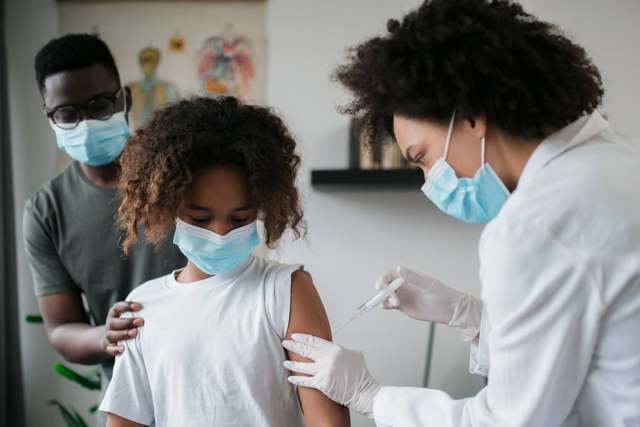With approval for Pfizer’s COVID-19 vaccine for children ages 5 to 11 expected in the coming weeks, pediatricians are hearing plenty of questions from parents about vaccine safety — regarding the new shot, the flu shot and pediatric vaccines in general.
UCLA Health pediatrician Carlos Lerner, MD, says most parents want to inoculate their children according to recommendations from the Centers for Disease Control and Prevention, which outlines which childhood vaccines should be given and when. But some parents have concerns, Dr. Lerner says, including potential safety of the vaccines and worries about their kids having to endure multiple needle pokes during doctor appointments.
Since the dawn of the COVID-19 pandemic, parents are also asking more questions about children’s immune response to vaccines. And there are some persistent myths Dr. Lerner finds himself debunking again and again.
Common vaccine myths
Among the most common myths is that childhood vaccines are linked to autism, a claim that has been refuted by studies involving hundreds of thousands of children, Dr. Lerner says.
“The rate of autism in kids who were or were not vaccinated is essentially the same,” he says. “There’s really no evidence that vaccinations increase the risk of autism.”
This myth is rooted in a very small study from the late-1990s that has since been proven fraudulent, but misinformation around the notion persists.
“We see symptoms of autism sometimes becoming obvious (in children) by 15 to 18 months, so whatever happens prior to that age, people point to as a possible cause of autism,” Dr. Lerner says. “And a very common one are the vaccinations that are given at that age, the MMR (measles-mumps-rubella) in particular.”
Worries about whether children’s immune systems can handle vaccinations are also common, he says.
“These are theoretical concerns that have been raised, really more online than anywhere,” Dr. Lerner says. “But they don’t have any basis in our scientific understanding of how the immune system works, nor does it take into account the really thorough studies that were done before approving any of these vaccines.”
Extensive studies comprising thousands of individuals are required before any vaccine receives approval from the U.S. Food and Drug Administration and recommendation by the CDC. Some parents, however, are less persuaded by scientific evidence and more interested in how Dr. Lerner approaches vaccination for his own children, he says.
“Some parents are compelled by the fact that, for my own kids, I chose to do the vaccines on the standard schedule,” he says.
COVID-19 vaccine concerns
No COVID-19 vaccine for children under age 12 has been approved by the FDA, but Pfizer has applied for emergency use authorization of its child-sized shot. A decision could come in early November.

The dosage for younger children is one-third the amount given to adolescents and adults. Federal health officials say they plan to marshal pediatricians, neighborhood pharmacies and school and rural health clinics to administer the shots — using smaller needles — once authorization is granted.
While Dr. Lerner has yet to see safety and efficacy data for the kids’ COVID-19 vaccine, “I trust the process by which these decisions are made in terms of making sure that the benefits of the vaccine outweigh any potential risks,” he says.
There have been rare cases of myocarditis, a swelling of the heart muscle, reported in some adolescents who have received the COVID-19 vaccine, but most resolved on their own or with the help of aspirin or ibuprofen. Dr. Lerner says the risk is small.
He uses a seatbelt analogy to describe the low risk and high benefits associated with the COVID-19 vaccine. When wearing a seatbelt, there’s a tiny chance your car could plunge into a lake and the seatbelt could prevent you from freeing yourself. But the likelihood of that is far lower than the seatbelt actually protecting you from serious injury in an accident.
“We’re not far off from that with the COVID vaccine with adolescents,” Dr. Lerner says. “For every case of myocarditis — which were quite mild and resolved with minimal treatment — there were dozens of hospitalizations prevented by vaccinated children and even several deaths. So it’s really an easy choice in my mind.”
Some people have concerns about potential long-term side effects of the COVID-19 vaccine in both adults and youngsters, but these long-term risks are very unlikely, Dr. Lerner says. Over many decades of experience with all kinds of vaccines, scientists find side effects of vaccines are largely short-term.
But long-term complications from COVID-19 are potentially a real risk, with potentially millions suffering from prolonged symptoms including brain fog, shortness of breath, fatigue and other issues associated with “long COVID syndrome.”
The essential flu vaccine
While COVID-19 vaccines for children ages 5 to 11 may be weeks away, one essential vaccine available now for nearly all children protects against the flu.
“We think the flu vaccine is particularly important this season,” Dr. Lerner says. “It’s recommended for any child over six months of age.”
Dr. Lerner finds parents are more hesitant about the flu vaccine than other routine childhood inoculations.
“The reality is that it’s probably one of the more important vaccines that we give, because flu is all around us,” he says. “I haven’t seen a case of polio my entire career. I don’t expect to see any. But I see kids hospitalized for flu all the time.”
Thousands of children are hospitalized for influenza in the U.S. every year and hundreds die, according to the CDC.
“Flu can be very serious for kids, particularly younger kids, and it’s fairly common in our community,” Dr. Lerner says. “So if you’re worried about COVID and being hospitalized, recognize that the flu can be just as dangerous for younger kids.
“You may not have the COVID vaccine yet available for your child, but the flu vaccine is available today.”
Track the latest information on UCLA Health's COVID-19 Vaccine Info Hub.




